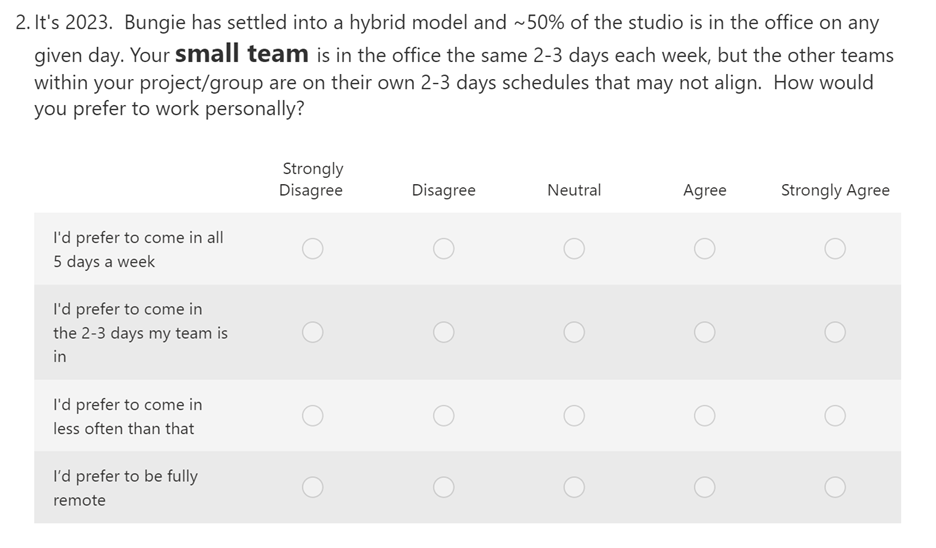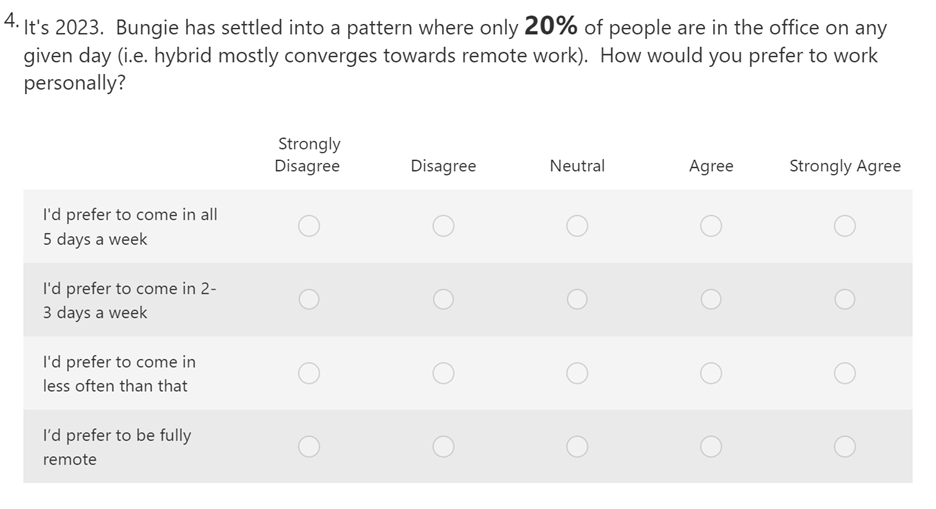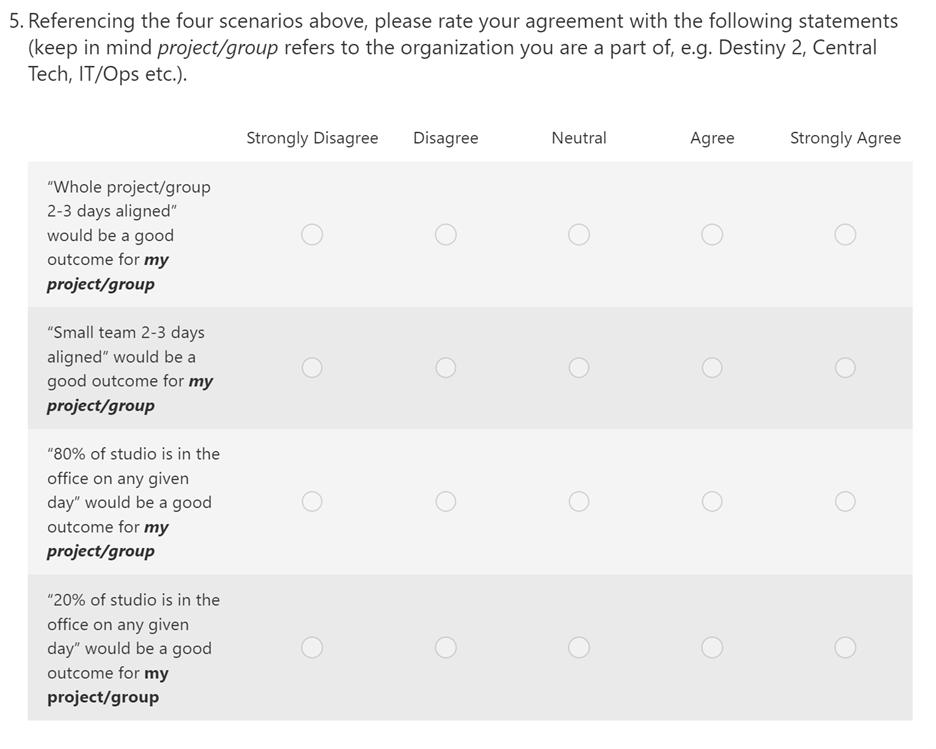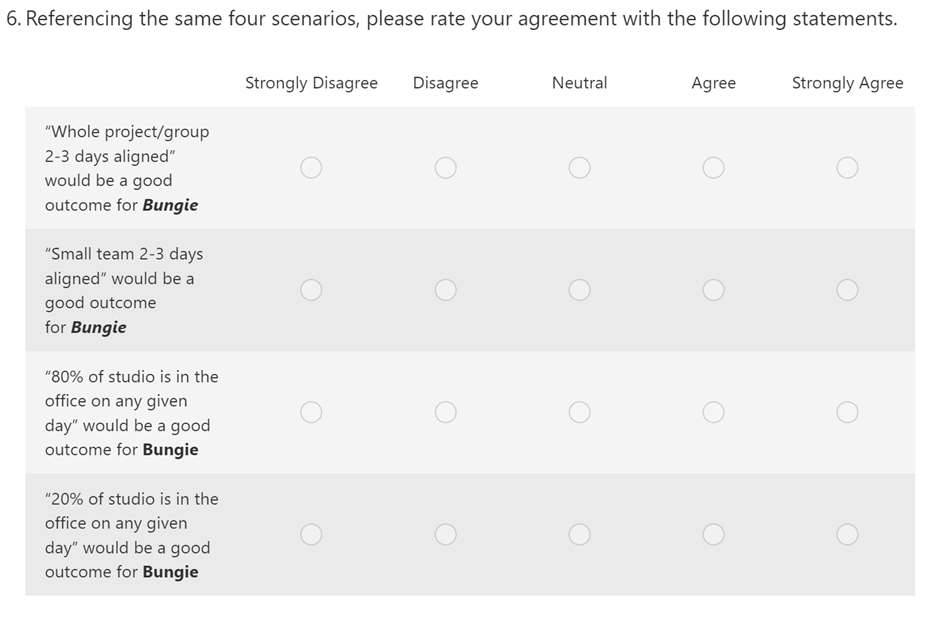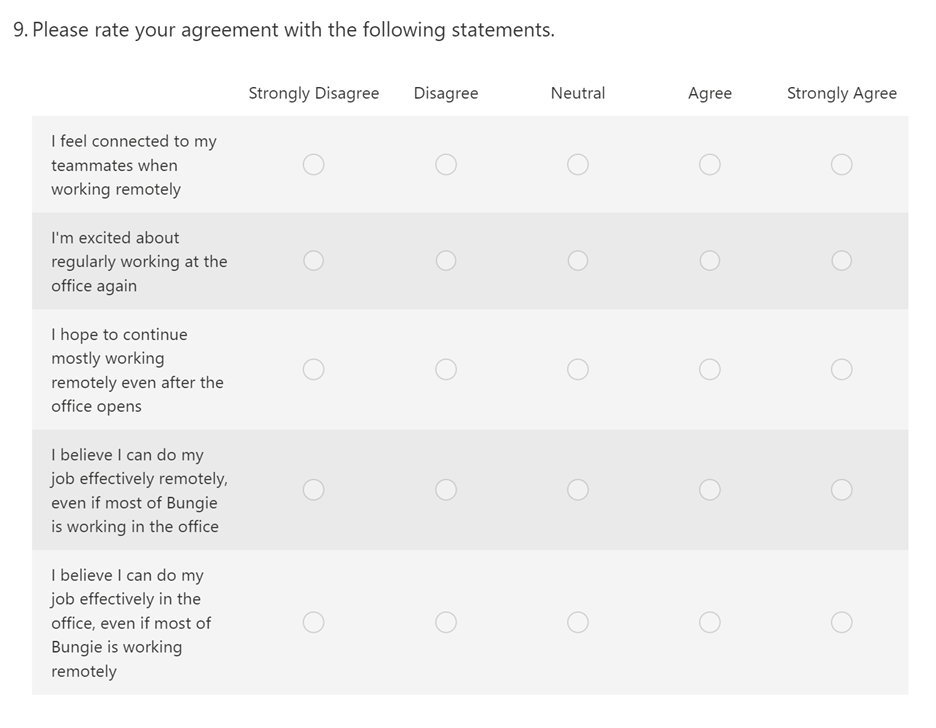Remote Work in Engineering #3 - Survey
Dec 8, 2022 - Bungie
Disclaimer: This series presents a story from the perspective of a single discipline, Engineering. In fact, many groups at Bungie were simultaneously grappling with these challenges, with lots of independent experimentation and cross-pollination of thinking. In particular, “we” here generally refers to Bungie as a whole, unless explicitly discussing engineering.
To recap the core dilemma we faced in late 2021: for 2022, before we start accruing real experience with full-scale hybrid, how hard should we lean into fully remote?
To try to inform our answer, we did a lot of reading. Harvard Business Review, New York Times, McKinsey, Microsoft Research, etc. Endless news about policies that other companies roll out, change, and change again. This reading wasn't just within engineering either—Bungie’s executive leadership team reads even more and has been deeply engaged with this dilemma company-wide, so we consulted heavily with them, along with partners in many other groups. From all this research and discussion, we drew three conclusions:
- Hybrid work will be challenging—it’ll present many new challenges that don’t happen when everyone is remote, and best practices haven’t yet emerged for most of those challenges.
- Significant amounts of WFH and remote work appeared to be inevitable given all the upsides for employee flexibility, costs, hiring, etc.
- In the meantime, there was no consensus on how much risk was reasonable to take in embracing the fully-remote pattern. Would embracing fully-remote undermine hybrid experiments too much before they’ve begun? Nobody knew.
In this kind of scenario, one of our go-to approaches is to try to understand what the people of Bungie want. There are challenges on both paths, but which set of challenges are we most excited to take on together?
Therefore, in October 2021, we set out to perform a deep work-model-preferences survey of Bungie engineers.
THE SURVEY
Now, we’d all read lots of public surveys on work-model-preferences and we didn’t really love their designs. There were three problems we kept seeing:- The surveys consistently elicited conflicting opinions—people want to work together regularly, but they also want high individual flexibility. That sounded to us suspiciously like “everyone wants the best of both worlds,” without enough consideration for the collective-action challenges involved (e.g., you can’t have a day in the office with your team unless there’s something coordinating the whole team being in the office on the same day). In this environment, simply averaging personal preferences doesn’t produce a coherent answer—it could easily be the worst of both worlds.
- We theorized that individual preferences would vary a lot based on what everyone else was doing—for example, if you assume 95% of the company is at the office every day, your personal preference for where to work would probably shift, because the value of being at the office is higher. We wanted to measure this to understand personal preferences in a variety of hypothetical situations.
- We hadn’t seen surveys that asked people what they thought would work best systemically, vs how they’d prefer to work personally. We thought people could separate those questions and give us useful advice and insights—we trust that they know their own preferences, but we also trust that they know how collaboration works in and around their team.
Ultimately, engineering leadership folks in collaboration with Manisha Hossain (a senior user researcher at Bungie focused on internal workflows) came up with a survey with questions like this (the full question set is in the appendix):
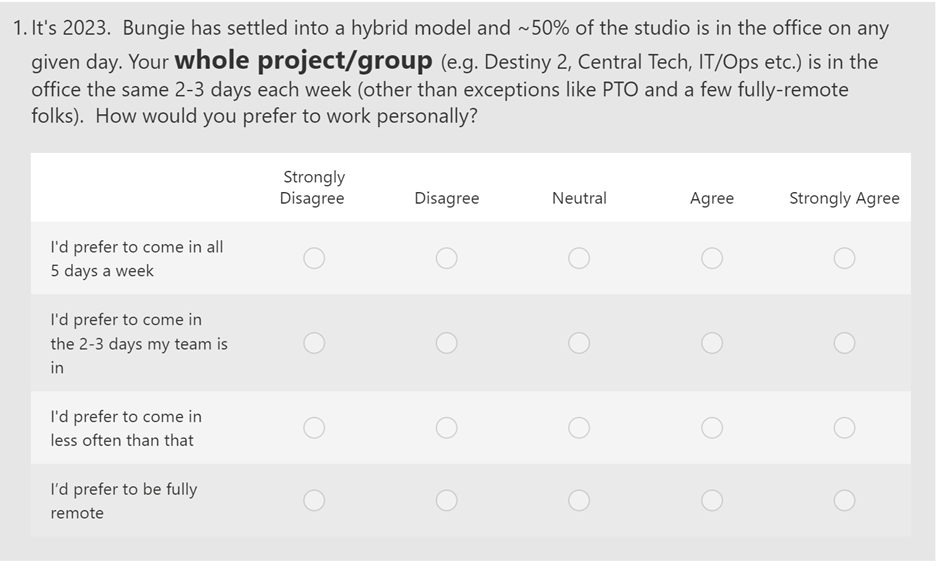
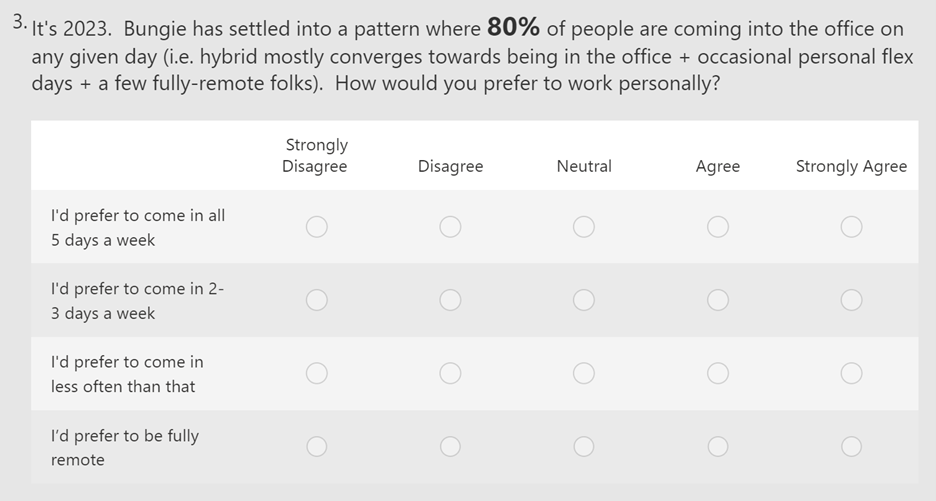
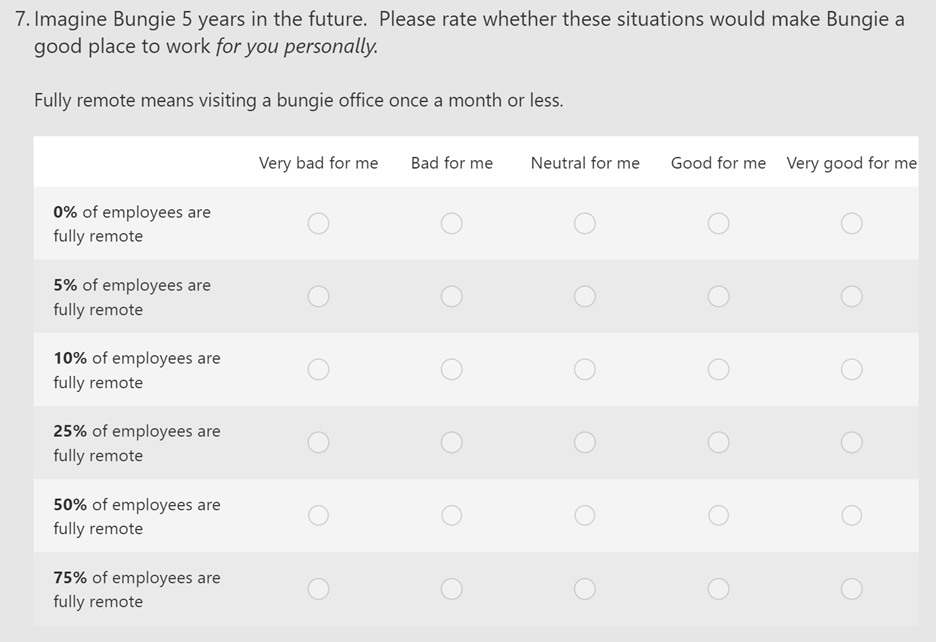
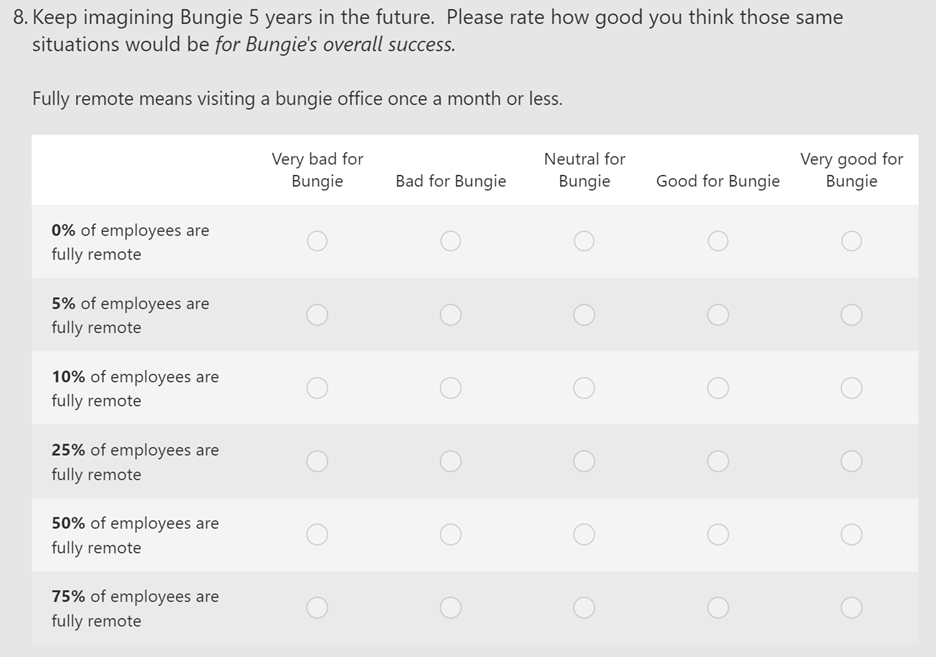 We executed this survey in October 2021, about 90% of Bungie engineers ended up completing it, and happily, we got the nuanced results we were looking for. For example, in the below results you can see a significant increase in the personal desire to come to the office five days a week in the scenario where 80% of Bungie is in the office on a given day, compared to the more-remote-heavy scenario where people on the same team are together in the office two to three days a week. This gave us data we needed about the size of various cohorts—it told us how many people were committed to a particular way of working vs having leanings that would shift depending on what everyone else did.
We executed this survey in October 2021, about 90% of Bungie engineers ended up completing it, and happily, we got the nuanced results we were looking for. For example, in the below results you can see a significant increase in the personal desire to come to the office five days a week in the scenario where 80% of Bungie is in the office on a given day, compared to the more-remote-heavy scenario where people on the same team are together in the office two to three days a week. This gave us data we needed about the size of various cohorts—it told us how many people were committed to a particular way of working vs having leanings that would shift depending on what everyone else did.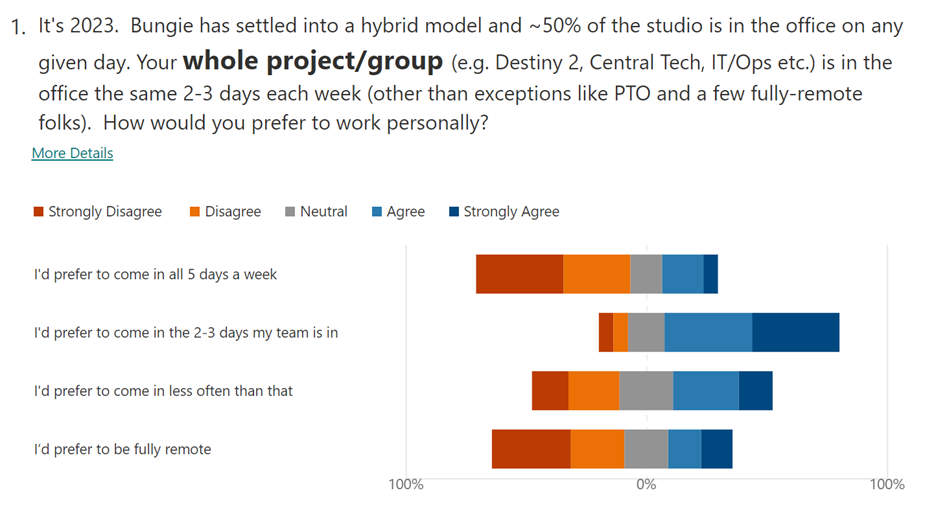
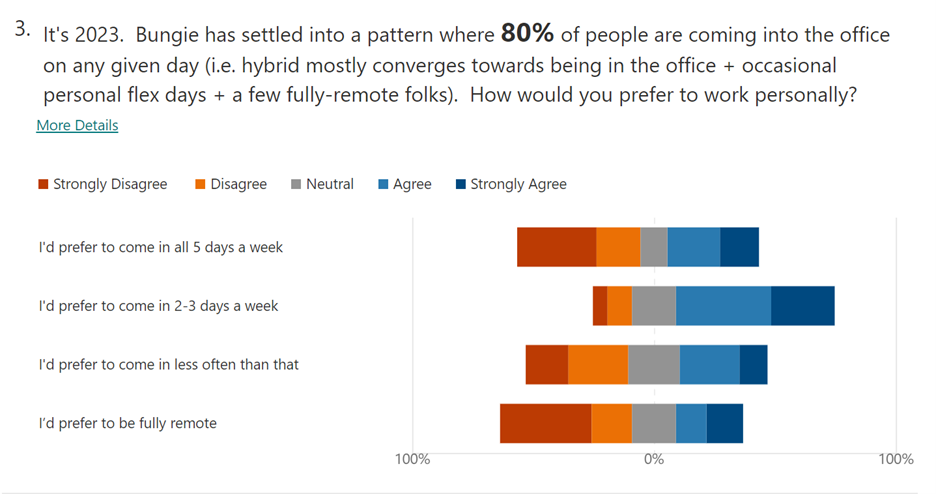 We also got a ton of long-form feedback, which we themed by hand. For example:
We also got a ton of long-form feedback, which we themed by hand. For example:- (8 [people said something like]) It’s very important to let people who want to be fully remote do that—for retention and recruiting.
- (6) I believe Bungie will adapt and thrive in any of these scenarios and so we should lean into letting individuals do what they want.
- (4) A large amount of remote interaction seems inevitable; we should lean into it and/or plan around it.
- (4) we’ll need to make significant investments in remote collaboration as hybrid spins up (culture, tools, etc.)—we’re definitely not good at it yet.
RESULTS
After a bunch of analysis, these were our top-line takeaways about the engineering team’s beliefs:- “2-3d a week in office, small-team-aligned” was the best starting point. ~70% of engineers thought this would produce a good outcome for Bungie (highest confidence of any scenario presented).
- The vast majority of engineers believed we should expect/allow/pursue 10-25% fully-remote over the next few years (and they believed that ending up above or below that range is scary, for different reasons).
- There were strong feelings in every corner. Every outcome tested saw at least 15% of engineers disagree-or-strongly-disagree that it would be good for Bungie.
- 11% of engineers were hardcore office, 26% were hardcore remote—these are people whose personal preferences are to work either fully-office or fully-remote regardless of what happens with Bungie as a whole.
- Uncertainty was high about what will turn out to be good for Bungie. E.g. for both of the extreme outcomes tested (80% in office each day and 20% in office each day), when asked whether that outcome would be good for Bungie, ~40% of engineers were neutral.
- (This makes me proud actually—I love working with people who are willing to say “I don’t know.”)
-David Aldridge, Head of Engineering

Would you like to work at Bungie?
We’d love to talk with you. Here are a couple of the most exciting tech roles we’re hiring for, with many more on our careers page!- Senior Mobile Graphics Engineer
We're looking for someone to help us port our in-house AAA engine (Tiger) to mobile, to give us a chance to inspire friendships among a few billion people who are mostly priced out of our current platforms.
No games experience required! If you've been doing graphics engineering on iOS or Android for a while in any context, we'd love to hear from you.
- Senior Mobile Platforms Engineer
Same deal, but we're looking for someone with a lot of low level mobile expertise besides graphics. This team is led by Eric Will, who has over a decade of experience in adapting our Tiger engine to different platforms. He's excited to learn about mobile from you and I promise you'll learn a lot from him.
No games experience required!
- Incubation Gameplay Engineering Lead
For more info on this particular incubation project, check out this two minute video.
Did you watch it? Go watch it!
Ok, so do you want to work for & with that guy? I think you should; I was lucky enough to get to for 12 years!
This one does require games experience - we're looking for someone who can lead a gameplay team and wants to make a smaller game within a larger studio.
Appendix - the full survey

